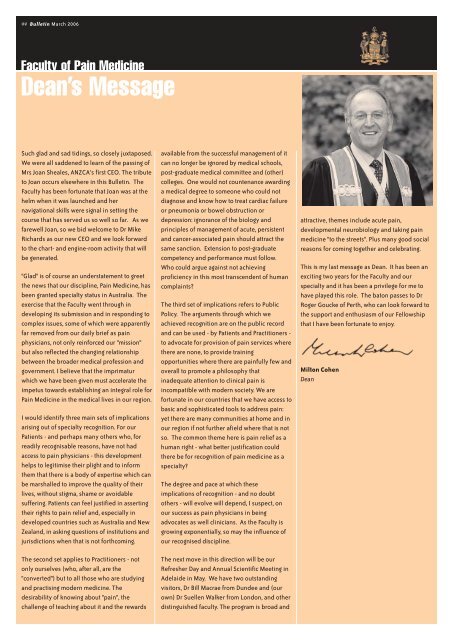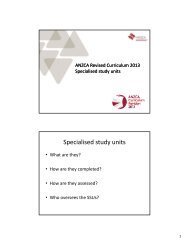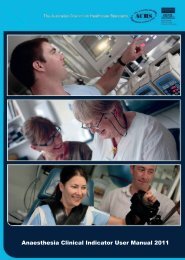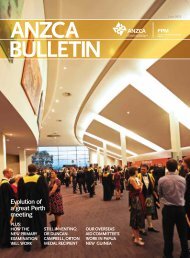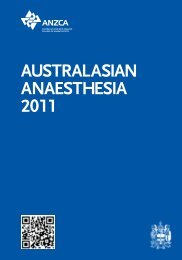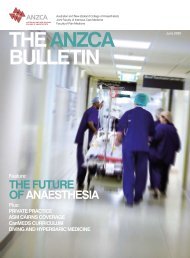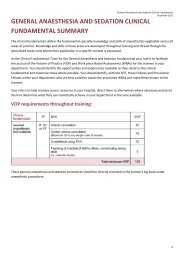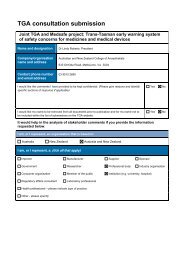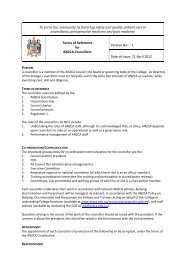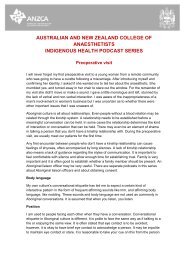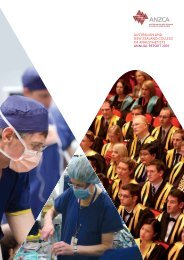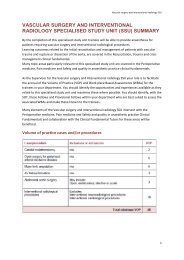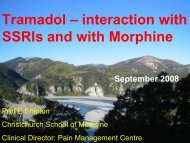ANZCA Bulletin - March 2006 - Australian and New Zealand College ...
ANZCA Bulletin - March 2006 - Australian and New Zealand College ...
ANZCA Bulletin - March 2006 - Australian and New Zealand College ...
Create successful ePaper yourself
Turn your PDF publications into a flip-book with our unique Google optimized e-Paper software.
44 <strong>Bulletin</strong> <strong>March</strong> <strong>2006</strong><br />
Faculty of Pain Medicine<br />
Dean’s Message<br />
Such glad <strong>and</strong> sad tidings, so closely juxtaposed.<br />
We were all saddened to learn of the passing of<br />
Mrs Joan Sheales, <strong>ANZCA</strong>'s first CEO. The tribute<br />
to Joan occurs elsewhere in this <strong>Bulletin</strong>. The<br />
Faculty has been fortunate that Joan was at the<br />
helm when it was launched <strong>and</strong> her<br />
navigational skills were signal in setting the<br />
course that has served us so well so far. As we<br />
farewell Joan, so we bid welcome to Dr Mike<br />
Richards as our new CEO <strong>and</strong> we look forward<br />
to the chart- <strong>and</strong> engine-room activity that will<br />
be generated.<br />
"Glad" is of course an understatement to greet<br />
the news that our discipline, Pain Medicine, has<br />
been granted specialty status in Australia. The<br />
exercise that the Faculty went through in<br />
developing its submission <strong>and</strong> in responding to<br />
complex issues, some of which were apparently<br />
far removed from our daily brief as pain<br />
physicians, not only reinforced our "mission"<br />
but also reflected the changing relationship<br />
between the broader medical profession <strong>and</strong><br />
government. I believe that the imprimatur<br />
which we have been given must accelerate the<br />
impetus towards establishing an integral role for<br />
Pain Medicine in the medical lives in our region.<br />
I would identify three main sets of implications<br />
arising out of specialty recognition. For our<br />
Patients - <strong>and</strong> perhaps many others who, for<br />
readily recognisable reasons, have not had<br />
access to pain physicians - this development<br />
helps to legitimise their plight <strong>and</strong> to inform<br />
them that there is a body of expertise which can<br />
be marshalled to improve the quality of their<br />
lives, without stigma, shame or avoidable<br />
suffering. Patients can feel justified in asserting<br />
their rights to pain relief <strong>and</strong>, especially in<br />
developed countries such as Australia <strong>and</strong> <strong>New</strong><br />
Zeal<strong>and</strong>, in asking questions of institutions <strong>and</strong><br />
jurisdictions when that is not forthcoming.<br />
The second set applies to Practitioners - not<br />
only ourselves (who, after all, are the<br />
"converted") but to all those who are studying<br />
<strong>and</strong> practising modern medicine. The<br />
desirability of knowing about "pain", the<br />
challenge of teaching about it <strong>and</strong> the rewards<br />
available from the successful management of it<br />
can no longer be ignored by medical schools,<br />
post-graduate medical committee <strong>and</strong> (other)<br />
colleges. One would not countenance awarding<br />
a medical degree to someone who could not<br />
diagnose <strong>and</strong> know how to treat cardiac failure<br />
or pneumonia or bowel obstruction or<br />
depression: ignorance of the biology <strong>and</strong><br />
principles of management of acute, persistent<br />
<strong>and</strong> cancer-associated pain should attract the<br />
same sanction. Extension to post-graduate<br />
competency <strong>and</strong> performance must follow.<br />
Who could argue against not achieving<br />
proficiency in this most transcendent of human<br />
complaints<br />
The third set of implications refers to Public<br />
Policy. The arguments through which we<br />
achieved recognition are on the public record<br />
<strong>and</strong> can be used - by Patients <strong>and</strong> Practitioners -<br />
to advocate for provision of pain services where<br />
there are none, to provide training<br />
opportunities where there are painfully few <strong>and</strong><br />
overall to promote a philosophy that<br />
inadequate attention to clinical pain is<br />
incompatible with modern society. We are<br />
fortunate in our countries that we have access to<br />
basic <strong>and</strong> sophisticated tools to address pain:<br />
yet there are many communities at home <strong>and</strong> in<br />
our region if not further afield where that is not<br />
so. The common theme here is pain relief as a<br />
human right - what better justification could<br />
there be for recognition of pain medicine as a<br />
specialty<br />
The degree <strong>and</strong> pace at which these<br />
implications of recognition - <strong>and</strong> no doubt<br />
others - will evolve will depend, I suspect, on<br />
our success as pain physicians in being<br />
advocates as well clinicians. As the Faculty is<br />
growing exponentially, so may the influence of<br />
our recognised discipline.<br />
The next move in this direction will be our<br />
Refresher Day <strong>and</strong> Annual Scientific Meeting in<br />
Adelaide in May. We have two outst<strong>and</strong>ing<br />
visitors, Dr Bill Macrae from Dundee <strong>and</strong> (our<br />
own) Dr Suellen Walker from London, <strong>and</strong> other<br />
distinguished faculty. The program is broad <strong>and</strong><br />
attractive, themes include acute pain,<br />
developmental neurobiology <strong>and</strong> taking pain<br />
medicine "to the streets". Plus many good social<br />
reasons for coming together <strong>and</strong> celebrating.<br />
This is my last message as Dean. It has been an<br />
exciting two years for the Faculty <strong>and</strong> our<br />
specialty <strong>and</strong> it has been a privilege for me to<br />
have played this role. The baton passes to Dr<br />
Roger Goucke of Perth, who can look forward to<br />
the support <strong>and</strong> enthusiasm of our Fellowship<br />
that I have been fortunate to enjoy.<br />
Milton Cohen<br />
Dean


